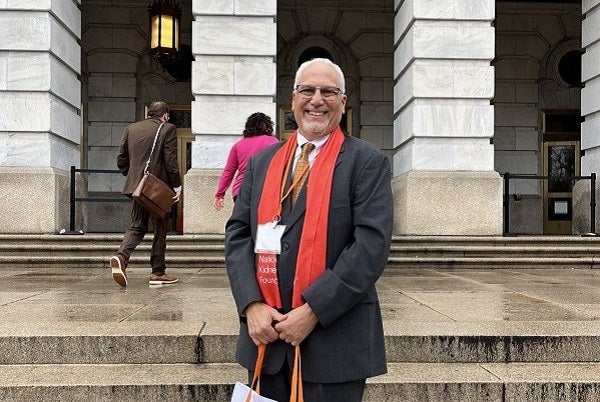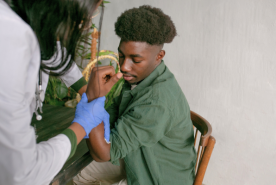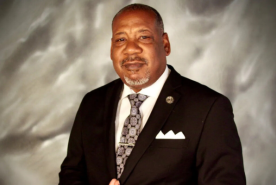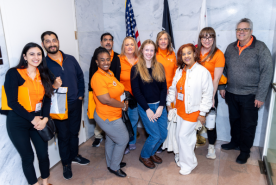July 11, 2023
As more states pass the Living Donor Protection Act, which protects living donors from insurance discrimination, the situation of kidney patients in North Carolina is becoming more dire. More than 1.7 million patients currently have kidney disease in the state and over 20,000 patients are on dialysis.*
The journey to a kidney transplant is one fraught with uncertainty and emotional turmoil, but protecting living donors can help by encouraging more people to donate.
“As a kidney transplant recipient, I feel compelled to share my story and advocate for better standards and support for transplant patients and living donors,” said Voices for Kidney Health Advocate Alan Levy. “I hope my experience can shed light on the challenges faced by those in need of a new kidney and highlight the importance of living organ donation”.
If you live in North Carolina and are interested in taking action with us, please click here.
The Path to Transplant
[VIDEO::http://www.youtube.com/watch?v=Sq_GCoxGPeQ::aVideoStyle]
The first step on his arduous path was getting on the transplant waitlist. In North Carolina, 3,233 patients are currently waiting for a lifesaving kidney transplant.1 The sad reality is that many of these patients may die while waiting for a kidney unless a living donor is willing to donate. Living donation is a selfless act where individuals willingly give an organ or a portion of an organ to someone who needs it. Remarkably, donors can still lead a healthy and fulfilling life with just one functioning kidney.
According to Levy, “The roller-coaster of hope and disappointment with multiple potential donors left me feeling torn between resignation and maintaining a positive outlook. Managing the psychological strain was challenging, but I was fortunate to have a support system that allowed me to stay engaged in other activities, providing a temporary respite from being a kidney patient.”
“In my case, I was fortunate to have three potential kidney donors’ step forward. However, the process of finding a suitable match was far from straightforward. Different transplant centers had inconsistent standards, leading to confusion and unnecessary delays. It took over a year of testing and rejections before a compatible donor was finally accepted. Had there been standardized guidelines across all transplant centers, my transplant could have been expedited, and my suffering on dialysis reduced”.
See if your state supports kidney health policies.
Receiving the Gift of Life
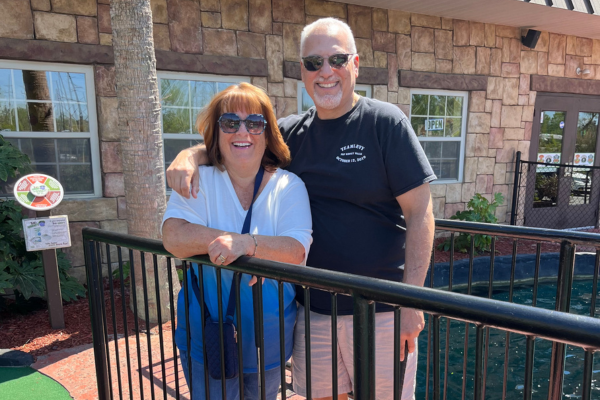
The escalating demand for lifesaving organ transplants in North Carolina surpasses the limited supply of deceased donor organs but living donation emerges as a vital avenue to extend life-saving transplants to more people in need. It provides an alternative for transplant candidates, alleviating the burden on the national transplant waiting list for organs from deceased donors.
Living donation also significantly improves the life of the recipient, which Levy can attest to.
“Receiving a kidney transplant brought about a transformation in my life. No longer tethered to a dialysis machine, I could finally embrace a sense of normalcy. My mental health improved, and fortunately, I experienced no complications from the procedure or medications. The ability to return to my daily routine and leave behind the confines of dialysis was a significant step towards emotional healing”.
“My perspective on life and health changed drastically after receiving the kidney transplant. The ease of post-transplant prescriptions and reduced pill burden gave me a newfound appreciation for simple daily tasks. It is astonishing how something as seemingly mundane as taking medications can transform the quality of life”.
“Having a living donor was an incredible blessing. Witnessing the altruism of three individuals willing to help was both humbling and inspiring. This experience has undoubtedly made me a better person, fostering a deep appreciation for living donors and their invaluable contributions”.
Learn more about our Big Ask, Big Give program and how you can help get the conversation started around living organ donation.
Protecting Heroic Donors
The protection and recognition of living organ donors are paramount. They make a substantial contribution to increasing the number of transplants each year, saving more lives. That is why the Living Donor Protection Act (LDPA) was introduced into the state House of Representatives. Living donors Kidney patients across North Carolina need the General Assembly to support HB 162, which aims to eliminate obstacles to organ donation.
This act will:
Prevent insurers from denying, limiting or charging higher premiums for life, disability or long-term care insurance based on someone’s status as a living organ donor.
Provide non-discretionary 30 days paid leave for state employees who donate an organ.
Provide a tax credit of up to $5,000 for living donors to offset costs incurred by the donor that aren’t covered by the recipient’s insurance.
A study conducted by Johns Hopkins indicated that nearly 1 in 4 living organ donors reported facing such discrimination after they donated their organ.2 To date, 31 states have passed versions of this bipartisan, no-cost legislation that removes barriers to donation and helps to save lives.
“Looking ahead, my aspirations revolve around ensuring that everyone in need of a transplant has access to one. Increased investment in research, both in the public and private sectors, is crucial to developing better treatments and potentially rendering dialysis obsolete,” Levy said. “My transplant journey taught me the significance of transparency, standardized guidelines, and public appreciation for living organ donors. By sharing my story, I hope to raise awareness and foster positive change, so that future kidney patients can find hope, support, and a second chance at life”.
By providing support to living donors, we foster an environment that encourages organ donation without imposing unnecessary barriers.
Big victories are possible with your voice
Raise your voice for kidney patients nationwide by contacting your Members of Congress and asking them to support kidney patients and issues important to you. See all the ways you can take action today.
1 Organ Procurement and Transplant Network (OPTN) (2023)
2 Boyarsky, B. J., Massie, A. B., Alejo, J. L., Van Arendonk, K. J., Wildonger, S., Garonzik-Wang, J. M., Montgomery, R. A., Deshpande, N. A., Muzaale, A. D., & Segev, D. L. (2014). Experiences obtaining insurance after live kidney donation. American journal of transplantation : official journal of the American Society of Transplantation and the American Society of Transplant Surgeons, 14(9), 2168–2172. https://doi.org/10.1111/ajt.12819
*The American Society of Nephrology (ASN) has created this estimation based on current census data and the national prevalence rate of Chronic Kidney Disease. For additional questions reach out to nkfadvocacy@kidney.org.
